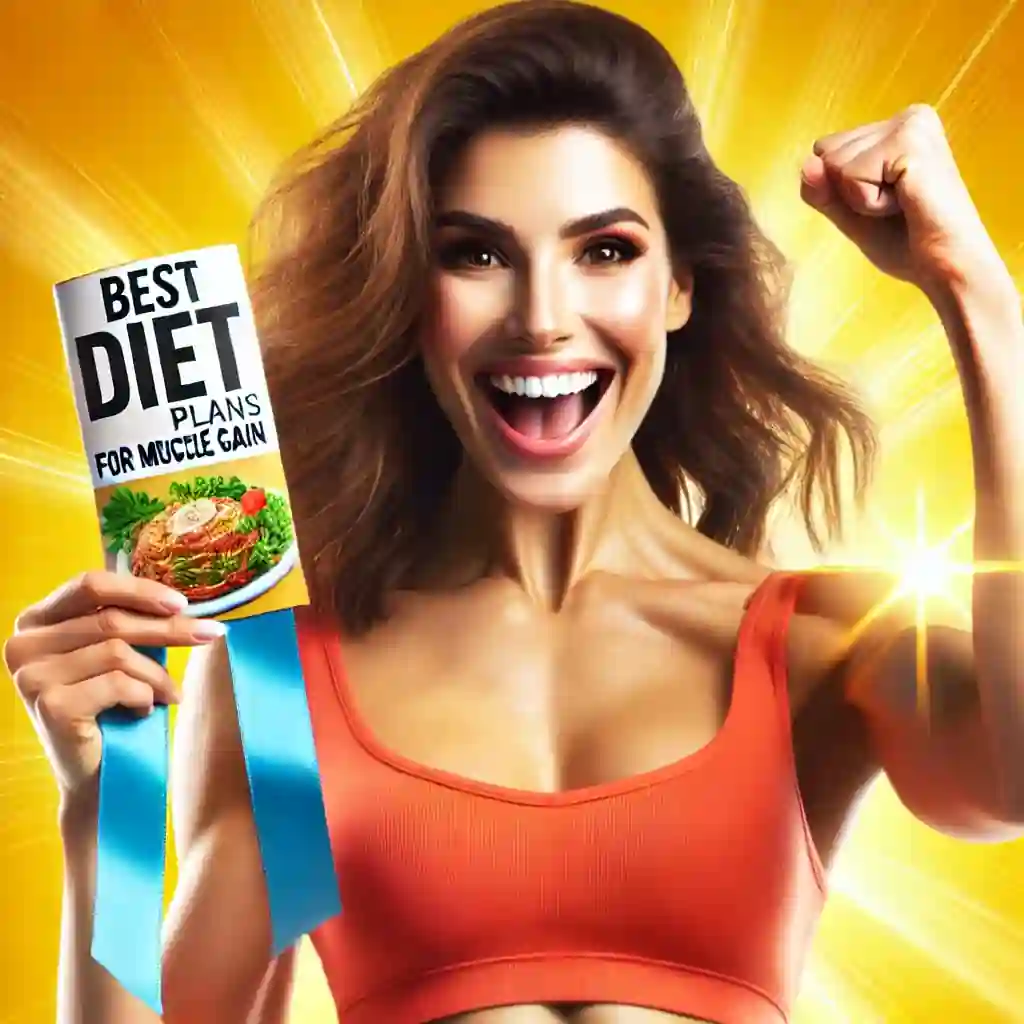Building muscle isn’t just about lifting weights; diet plays a crucial role in your muscle gain journey. Whether you’re just starting out with resistance training or are a seasoned fitness enthusiast, the right nutrition is essential to maximize your gains and achieve your fitness goals.we’ll explore the best diet plans for muscle gain.
A common objective for many is to gain muscle while losing fat. This dual goal can be challenging but is absolutely attainable with the right diet plan. By focusing on the right balance of macronutrients and consuming high-quality foods, you can fuel your workouts, promote muscle growth, and enhance fat loss simultaneously.
In this blog post, we’ll explore the best diet plans for muscle gain, tailored to fit various needs and preferences. Whether you’re a beginner looking for a simple starting point, a vegetarian seeking plant-based protein sources, or someone aiming to achieve muscle growth without supplements, we’ve got you covered. We’ll also dive into specific plans for men and women, ensuring you find the right fit for your body and goals.
Table of Contents
Understanding Muscle Gain and Fat Loss
Achieving muscle gain and fat loss simultaneously is a common goal but requires a deep understanding of the body’s processes. Let’s break it down into simple terms to help you grasp the essentials. Healthline – How to Build Muscle
The Muscle Gain and Fat Loss Process
When you engage in resistance training or weightlifting, your muscles undergo tiny tears. These tears need to be repaired, which is where muscle growth, or hypertrophy, happens. Your body needs protein to repair these muscles, leading to increased muscle mass.
On the flip side, fat loss occurs when your body burns more calories than it consumes. This caloric deficit forces the body to use stored fat for energy. However, if you’re not careful, you might lose muscle along with fat, which is why a balanced diet is crucial.
Importance of a Balanced Diet in Achieving These Goals
A balanced diet ensures that your body gets all the nutrients it needs to perform optimally. For muscle gain and fat loss, this means:
- High protein intake to repair and build muscles
- Healthy fats for sustained energy and hormone production
- Complex carbohydrates to fuel your workouts and aid recovery
Without a balanced diet, you might not see the results you’re aiming for. Protein-rich foods like chicken, fish, eggs, and plant-based options are essential. Additionally, incorporating healthy fats from sources like avocados and nuts, and complex carbs like oats and brown rice, will support your muscle-building and fat-loss goals.
How Diet and Exercise Work Together for Muscle Building
Exercise and diet are like two sides of the same coin when it comes to building muscle. While workouts provide the stimulus for muscle growth, your diet supplies the necessary building blocks. Here’s how they complement each other:
- Post-workout nutrition: After a workout, your muscles are primed to absorb nutrients. Consuming a meal with a good mix of protein and carbohydrates within 30 minutes to an hour post-exercise can maximize muscle repair and growth.
- Consistent protein intake: Spread your protein intake throughout the day to ensure a constant supply of amino acids for muscle repair. Aim for about 20-30 grams of protein per meal.
- Hydration: Staying hydrated is often overlooked but is vital for muscle function and recovery. Water helps transport nutrients to your muscles and aids in digestion.
High Protein Diet Plan for Muscle Building
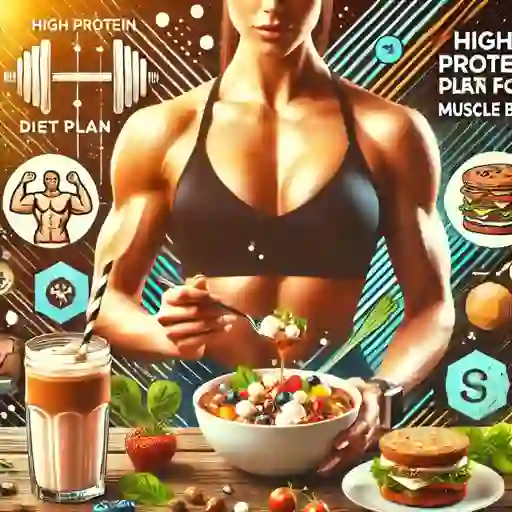
Role of Protein in Muscle Growth
Protein is the cornerstone of muscle growth. It provides the essential amino acids your body needs to repair and build muscle tissues after workouts. When you lift weights or engage in resistance training, your muscle fibers experience tiny tears. Consuming enough protein ensures these fibers are repaired and grow back stronger, leading to muscle gain.Mayo Clinic – Nutrition and Healthy Eating
Recommended Daily Protein Intake
To maximize muscle growth, it’s crucial to consume the right amount of protein. The recommended daily protein intake for muscle building typically ranges from 1.6 to 2.2 grams of protein per kilogram of body weight. For example, if you weigh 70 kg, you should aim for 112 to 154 grams of protein daily. Consuming protein throughout the day, especially after workouts, helps maintain a steady supply of amino acids for muscle repair.
Sample High-Protein Diet Plan
Here’s a sample high-protein diet plan designed to fuel your muscle-building efforts. This plan includes balanced meals with high protein content to keep you energized and support muscle growth.
Breakfast
- Protein-packed Omelette: 3 egg whites, 1 whole egg, spinach, mushrooms, and a sprinkle of cheese.
- Greek Yogurt with Berries: 1 cup of Greek yogurt topped with fresh berries and a tablespoon of chia seeds.
- Protein Smoothie: Blend 1 scoop of protein powder, 1 banana, a handful of spinach, and almond milk.
Mid-Morning Snack
- Cottage Cheese and Fruit: 1 cup of cottage cheese with sliced peaches or pineapple.
- Protein Bars: Choose bars with at least 20 grams of protein.
Lunch
- Grilled Chicken Salad: Mixed greens, cherry tomatoes, cucumber, grilled chicken breast, and a light vinaigrette.
- Quinoa Bowl: Quinoa, black beans, corn, avocado, and a dollop of Greek yogurt.
Afternoon Snack
- Hard-Boiled Eggs: 2 hard-boiled eggs with a dash of pepper.
- Hummus and Veggies: Carrot sticks, cucumber slices, and bell pepper strips with hummus.
Dinner
- Baked Salmon: 200 grams of baked salmon with a side of steamed broccoli and quinoa.
- Stir-Fried Tofu: Tofu stir-fried with mixed vegetables and a splash of soy sauce, served over brown rice.
Evening Snack
- Casein Protein Shake: 1 scoop of casein protein powder mixed with water or milk.
- Nuts and Seeds Mix: A handful of almonds, walnuts, and sunflower seeds.
Example Meals and Recipes
Protein-Packed Omelette Recipe
Ingredients:
- 3 egg whites
- 1 whole egg
- 1 cup spinach
- ½ cup mushrooms, sliced
- ¼ cup shredded cheese
Instructions:
- Whisk the egg whites and whole egg in a bowl.
- Heat a non-stick skillet over medium heat and add the eggs.
- Add spinach and mushrooms to the eggs.
- Cook until eggs are set, then sprinkle cheese on top.
- Fold the omelette in half and serve hot.
Grilled Chicken Salad Recipe
Ingredients:
- 1 grilled chicken breast
- 2 cups mixed greens
- ½ cup cherry tomatoes, halved
- ½ cucumber, sliced
- 2 tablespoons light vinaigrette
Instructions:
- Slice the grilled chicken breast.
- Toss mixed greens, cherry tomatoes, and cucumber in a bowl.
- Add the sliced chicken on top.
- Drizzle with light vinaigrette and toss gently.
Muscle Gain Diet Plan for Beginners
Basic Principles for Beginners
Starting your muscle-building journey can be both exciting and challenging. As a beginner, it’s essential to understand the basic principles for muscle gain. These principles include eating the right foods, maintaining a caloric surplus, and ensuring you get enough rest. By following these guidelines, you can build a strong foundation for effective muscle growth.
Importance of Macronutrients (Proteins, Fats, and Carbohydrates)
To build muscle, your diet must be rich in macronutrients – proteins, fats, and carbohydrates. Each of these plays a crucial role in your fitness journey:
- Proteins: The building blocks of muscle, proteins are essential for repair and growth. Aim to include high-protein foods like chicken, fish, eggs, and legumes in your diet.
- Fats: Healthy fats provide sustained energy and support hormone production. Incorporate sources like avocados, nuts, and olive oil.
- Carbohydrates: Carbs fuel your workouts and aid recovery. Opt for complex carbohydrates such as oats, brown rice, and sweet potatoes.
Balancing these macronutrients ensures your body gets the necessary nutrients to build muscle effectively.
Simple and Easy-to-Follow Diet Plan
A diet plan that is simple and easy to follow is key for beginners. The plan should include a variety of foods to keep meals interesting and nutritious. Here’s a step-by-step guide to daily meals designed for muscle gain:
Breakfast
- Scrambled Eggs with Spinach: 3 eggs scrambled with fresh spinach, served with whole-grain toast.
- Oatmeal with Protein Powder: 1 cup of oats cooked with water or milk, mixed with a scoop of protein powder, and topped with berries.
Mid-Morning Snack
- Greek Yogurt and Almonds: 1 cup of Greek yogurt with a handful of almonds.
- Apple with Peanut Butter: Sliced apple with 2 tablespoons of natural peanut butter.
Lunch
- Chicken and Quinoa Salad: Grilled chicken breast served over a bed of quinoa, mixed greens, cherry tomatoes, and a light vinaigrette.
- Turkey and Avocado Wrap: Whole-wheat wrap filled with sliced turkey, avocado, lettuce, and a drizzle of mustard.
Afternoon Snack
- Cottage Cheese and Pineapple: 1 cup of cottage cheese mixed with pineapple chunks.
- Protein Shake: Blend 1 scoop of protein powder with a banana and almond milk.
Dinner
- Baked Salmon with Sweet Potatoes: 200 grams of baked salmon served with roasted sweet potatoes and steamed broccoli.
- Beef Stir-Fry: Lean beef strips stir-fried with bell peppers, onions, and served over brown rice.
Evening Snack
- Casein Protein Pudding: Mix 1 scoop of casein protein powder with water or milk to create a pudding-like consistency.
- Mixed Nuts: A small handful of mixed nuts like almonds, walnuts, and cashews.
Step-by-Step Guide to Daily Meals
Morning Routine
- Start your day with a high-protein breakfast to kickstart muscle repair and growth.
- Enjoy a mid-morning snack that includes protein and healthy fats to keep you fueled until lunch.
Afternoon Routine
- For lunch, focus on a balanced meal with proteins, carbs, and vegetables to sustain your energy levels.
- An afternoon snack will help you recover from morning activities and prepare you for any afternoon workouts.
Evening Routine
- Dinner should be nutrient-dense to support muscle recovery overnight.
- An evening snack with slow-digesting protein, like casein, will keep your muscles nourished while you sleep.
Best Foods for Muscle Growth and Strength
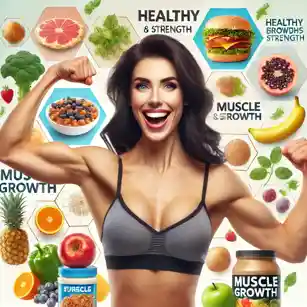
List of Nutrient-Dense Foods
To build muscle and gain strength, your body needs the right fuel. Here’s a list of nutrient-dense foods that are essential for muscle growth and strength:
- Lean Meats
- Fish
- Eggs
- Dairy
- Legumes
- Nuts and Seeds
- Whole Grains
Lean Meats
Lean meats, such as chicken and turkey, are packed with high-quality protein, essential for muscle repair and growth. They are also rich in iron, which helps carry oxygen to your muscles, boosting endurance and performance.
Benefits:
- High in protein
- Low in fat
- Rich in iron and B vitamins
Incorporate into your diet:
- Grill or bake chicken breasts for lunch or dinner
- Add sliced turkey to your salads or sandwiches
Fish
Fish, especially fatty fish like salmon and tuna, are excellent sources of protein and omega-3 fatty acids. Omega-3s reduce inflammation, aiding in quicker recovery and muscle building.
Benefits:
- High in protein
- Rich in omega-3 fatty acids
- Supports heart health
Incorporate into your diet:
- Enjoy grilled salmon with a side of vegetables
- Add canned tuna to your salads or whole-grain crackers
Eggs
Eggs are one of the most versatile and nutrient-dense foods. They contain all nine essential amino acids, making them a complete protein source.
Benefits:
- Complete protein
- Rich in vitamins and minerals
- Supports muscle repair
Incorporate into your diet:
- Have scrambled or boiled eggs for breakfast
- Add eggs to your salads or stir-fries
Dairy
Dairy products like Greek yogurt, cottage cheese, and milk are rich in protein and calcium, which is essential for muscle contraction and bone health.
Benefits:
- High in protein
- Rich in calcium
- Supports muscle and bone health
Incorporate into your diet:
- Enjoy Greek yogurt with berries for a snack
- Add cottage cheese to your fruit salads
Legumes
Legumes such as beans, lentils, and chickpeas are excellent plant-based protein sources. They are also rich in fiber, which aids digestion and keeps you full.
Benefits:
- High in protein and fiber
- Rich in iron and folate
- Supports muscle repair and digestion
Incorporate into your diet:
- Add lentils to your soups or stews
- Enjoy hummus made from chickpeas with vegetable sticks
Nuts and Seeds
Nuts and seeds are not only high in protein but also provide healthy fats and essential vitamins and minerals.
Benefits:
- High in protein and healthy fats
- Rich in vitamins and minerals
- Supports overall health
Incorporate into your diet:
- Snack on a handful of almonds or walnuts
- Sprinkle chia seeds or flaxseeds on your smoothies or yogurt
Whole Grains
Whole grains like oats, quinoa, and brown rice provide complex carbohydrates, which are essential for fueling your workouts and aiding in muscle recovery.
Benefits:
- High in complex carbohydrates and fiber
- Rich in vitamins and minerals
- Supports energy levels and recovery
Incorporate into your diet:
- Start your day with a bowl of oatmeal
- Use quinoa or brown rice as a base for your meals
How to Incorporate These Foods into Your Diet
Incorporating these nutrient-dense foods into your diet is simple and can be done in various ways:
- Meal Prep: Prepare your meals in advance to ensure you have balanced, protein-rich meals ready throughout the week.
- Variety: Mix and match different foods to keep your meals interesting and nutritious.
- Snacking: Choose healthy snacks like nuts, seeds, and Greek yogurt to maintain your protein intake between meals.
Effective Diet for Gaining Muscle Mass
Strategies for Effective Muscle Gain
To effectively gain muscle mass, it’s crucial to follow a well-structured diet plan. Here are some key strategies for effective muscle gain:
- Caloric Surplus: To build muscle, you need to consume more calories than your body burns. This caloric surplus provides the extra energy required for muscle growth.
- High Protein Intake: Protein is essential for muscle repair and growth. Aim to consume 1.6 to 2.2 grams of protein per kilogram of body weight daily.
- Balanced Macronutrients: Ensure your diet includes the right balance of proteins, fats, and carbohydrates to support overall health and muscle gain.
- Nutrient Timing: Eat protein-rich meals and snacks throughout the day, especially before and after workouts, to maximize muscle repair and growth.
- Hydration: Staying well-hydrated is crucial for muscle function and recovery. Aim to drink at least 3 liters of water daily.
Caloric Surplus and Nutrient Timing
A caloric surplus is essential for gaining muscle mass. This means consuming more calories than your body needs to maintain its current weight. Typically, a surplus of 250 to 500 calories per day is recommended for gradual and sustainable muscle gain.
Nutrient timing involves eating specific nutrients at strategic times to maximize their benefits. Here’s how you can optimize nutrient timing for muscle gain:
- Pre-Workout: Consume a meal rich in carbohydrates and protein about 1-2 hours before your workout. This provides energy and amino acids for muscle repair.
- Post-Workout: Have a high-protein meal or shake within 30 minutes to an hour after your workout to kickstart muscle recovery.
- Throughout the Day: Spread your protein intake evenly across all meals and snacks to ensure a constant supply of amino acids for muscle repair and growth.
Detailed Meal Plan
Here’s a detailed meal plan designed to support muscle gain. This plan includes a balance of macronutrients and is structured to maintain a caloric surplus.
Caloric and Macronutrient Breakdown
- Daily Caloric Intake: 2,800 – 3,000 calories
- Proteins: 160 – 200 grams
- Fats: 80 – 100 grams
- Carbohydrates: 350 – 400 grams
Example Daily Menu
Breakfast
- Protein-Packed Smoothie: Blend 1 scoop of protein powder, 1 banana, 1 cup of spinach, 1 tablespoon of peanut butter, and almond milk.
- Oatmeal with Berries: 1 cup of oatmeal cooked with water or milk, topped with fresh berries and a drizzle of honey.
Mid-Morning Snack
- Greek Yogurt with Nuts: 1 cup of Greek yogurt topped with a handful of mixed nuts and a teaspoon of chia seeds.
- Apple with Almond Butter: 1 sliced apple with 2 tablespoons of almond butter.
Lunch
- Grilled Chicken and Quinoa Salad: Mixed greens, 1 grilled chicken breast, 1 cup of quinoa, cherry tomatoes, cucumbers, and a light vinaigrette.
- Whole-Grain Wrap: Whole-wheat wrap with turkey, avocado, lettuce, and a sprinkle of cheese.
Afternoon Snack
- Cottage Cheese and Pineapple: 1 cup of cottage cheese mixed with pineapple chunks.
- Protein Shake: 1 scoop of protein powder blended with water or milk.
Dinner
- Baked Salmon with Sweet Potatoes: 200 grams of baked salmon served with roasted sweet potatoes and steamed asparagus.
- Beef Stir-Fry: Lean beef strips stir-fried with bell peppers, onions, and broccoli, served over brown rice.
Evening Snack
- Casein Protein Pudding: Mix 1 scoop of casein protein powder with water or milk to create a pudding-like consistency.
- Mixed Nuts: A small handful of mixed nuts like almonds, walnuts, and cashews.
Muscle Gain Meal Plan for Vegetarians
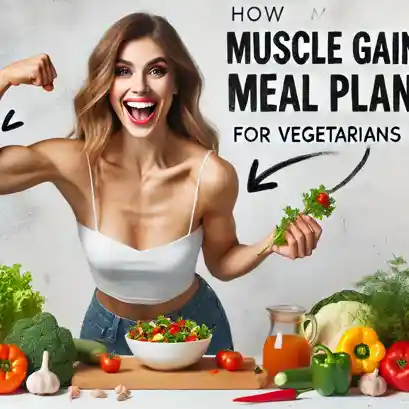
Challenges and Solutions for Vegetarians
Building muscle as a vegetarian comes with its own set of challenges. The most common concern is getting enough protein without relying on meat or fish. However, with the right approach, you can easily overcome these challenges and achieve impressive muscle gains.
Challenges:
- Protein Intake: Many vegetarian sources of protein have lower protein content compared to meat.
- Complete Proteins: Some vegetarian foods lack all the essential amino acids needed for muscle repair.
- Caloric Intake: Ensuring a caloric surplus without consuming meat can be challenging but essential for muscle gain.
Solutions:
- Variety: Incorporate a variety of high-protein vegetarian foods to meet your protein needs.
- Complementary Proteins: Combine different protein sources to create complete proteins.
- Caloric Density: Include calorie-dense foods like nuts, seeds, and healthy fats to maintain a caloric surplus.
High-Protein Vegetarian Food Sources
To ensure you’re getting enough protein, focus on these high-protein vegetarian food sources:
- Legumes: Lentils, chickpeas, black beans, and other legumes are rich in protein and fiber.
- Tofu and Tempeh: These soy-based products are excellent sources of complete protein.
- Greek Yogurt: A single serving of Greek yogurt can provide up to 20 grams of protein.
- Cottage Cheese: Another dairy product high in protein, perfect for snacks or meals.
- Quinoa: A complete protein that also provides essential amino acids.
- Nuts and Seeds: Almonds, chia seeds, hemp seeds, and flaxseeds are great for adding protein and healthy fats.
- Eggs: If you’re a lacto-ovo vegetarian, eggs are a fantastic protein source.
Vegetarian Muscle Gain Diet Plan
Creating a balanced vegetarian muscle gain diet plan involves incorporating these high-protein foods into your daily meals. Here’s a sample meal plan to get you started:
Example Meals and Recipes
Breakfast
- Protein Pancakes: Blend 1 cup of oats, 1 banana, 1 scoop of protein powder, and 2 eggs. Cook on a skillet and top with Greek yogurt and berries.
- Quinoa Porridge: Cook 1 cup of quinoa with almond milk, add a tablespoon of chia seeds, and top with sliced almonds and fresh fruit.
Mid-Morning Snack
- Greek Yogurt Parfait: 1 cup of Greek yogurt layered with granola, mixed berries, and a drizzle of honey.
- Smoothie: Blend 1 scoop of protein powder, 1 banana, a handful of spinach, and almond milk.
Lunch
- Chickpea Salad: Mix 1 cup of chickpeas with diced cucumbers, tomatoes, red onions, and a lemon-tahini dressing.
- Tofu Stir-Fry: Stir-fry tofu with broccoli, bell peppers, and snap peas in a soy-ginger sauce, served over brown rice.
Afternoon Snack
- Hummus and Veggies: 1 cup of hummus served with carrot sticks, cucumber slices, and bell pepper strips.
- Protein Bar: Choose a high-protein bar with at least 20 grams of protein.
Dinner
- Lentil Curry: Cook lentils with coconut milk, spinach, and a blend of spices. Serve with quinoa or brown rice.
- Stuffed Bell Peppers: Fill bell peppers with a mixture of quinoa, black beans, corn, and diced tomatoes, topped with cheese and baked until tender.
Evening Snack
- Cottage Cheese with Pineapple: 1 cup of cottage cheese mixed with pineapple chunks.
- Almond Butter and Apple Slices: Sliced apple served with 2 tablespoons of almond butter.
Recipes
Protein Pancakes Recipe
Ingredients:
- 1 cup oats
- 1 banana
- 1 scoop protein powder
- 2 eggs
Instructions:
- Blend oats, banana, protein powder, and eggs until smooth.
- Heat a skillet over medium heat and pour batter to form pancakes.
- Cook until bubbles form, flip, and cook until golden brown.
- Serve with Greek yogurt and berries.
Lentil Curry Recipe
Ingredients:
- 1 cup lentils
- 1 can coconut milk
- 2 cups spinach
- 1 tablespoon curry powder
- 1 teaspoon turmeric
- Salt and pepper to taste
Instructions:
- Cook lentils according to package instructions.
- In a large pot, combine cooked lentils, coconut milk, spinach, and spices.
- Simmer for 10-15 minutes until spinach is wilted and flavors meld.
- Serve over quinoa or brown rice.
Healthy Muscle Building Diet for Men
Specific Nutritional Needs for Men
When it comes to building muscle, men have unique nutritional needs that must be met to achieve optimal results. Men typically require more calories and protein than women due to their larger muscle mass and higher metabolism. Ensuring a diet rich in lean proteins, complex carbohydrates, and healthy fats is crucial for muscle growth and overall health.
Key nutrients for muscle building in men include:
- Protein: Essential for muscle repair and growth. Aim for at least 1.6 to 2.2 grams per kilogram of body weight.
- Carbohydrates: Provide the energy needed for intense workouts and recovery. Focus on complex carbs like oats, brown rice, and sweet potatoes.
- Healthy Fats: Support hormone production and overall health. Include sources like avocados, nuts, and olive oil.
- Vitamins and Minerals: Crucial for overall health and muscle function. Ensure a diet rich in vegetables, fruits, and whole grains.
Importance of Dietary Supplements (If Applicable)
While a well-balanced diet should provide most of the nutrients needed, dietary supplements can be beneficial for filling in any gaps and enhancing muscle growth. Here are some supplements that might be useful:
- Protein Powder: Convenient for meeting daily protein requirements, especially post-workout.
- Creatine: Supports increased strength and muscle mass by boosting energy production in muscle cells.
- Branched-Chain Amino Acids (BCAAs): Help reduce muscle soreness and support recovery.
- Multivitamins: Ensure you get all essential vitamins and minerals.
- Omega-3 Fatty Acids: Promote heart health and reduce inflammation.
Always consult with a healthcare provider before starting any supplement regimen.
Sample Diet Plan Tailored for Men
Here’s a sample diet plan tailored for men that supports muscle building. This plan includes balanced meals with high protein, healthy fats, and complex carbohydrates.
Breakfast
- Egg White Omelette: 4 egg whites, 1 whole egg, spinach, tomatoes, and a sprinkle of cheese.
- Oatmeal with Protein Powder: 1 cup of oats cooked with water or milk, mixed with a scoop of protein powder, and topped with fresh berries.
Mid-Morning Snack
- Greek Yogurt and Almonds: 1 cup of Greek yogurt with a handful of almonds.
- Protein Smoothie: Blend 1 scoop of protein powder, 1 banana, a handful of spinach, and almond milk.
Lunch
- Grilled Chicken and Quinoa Salad: Mixed greens, 1 grilled chicken breast, 1 cup of quinoa, cherry tomatoes, cucumbers, and a light vinaigrette.
- Turkey and Avocado Wrap: Whole-wheat wrap filled with sliced turkey, avocado, lettuce, and a drizzle of mustard.
Afternoon Snack
- Cottage Cheese and Pineapple: 1 cup of cottage cheese mixed with pineapple chunks.
- Protein Bar: Choose a high-protein bar with at least 20 grams of protein.
Dinner
- Baked Salmon with Sweet Potatoes: 200 grams of baked salmon served with roasted sweet potatoes and steamed broccoli.
- Beef Stir-Fry: Lean beef strips stir-fried with bell peppers, onions, and snap peas, served over brown rice.
Evening Snack
- Casein Protein Shake: 1 scoop of casein protein powder mixed with water or milk.
- Mixed Nuts: A small handful of mixed nuts like almonds, walnuts, and cashews.
Women’s Diet Plan for Muscle Gain
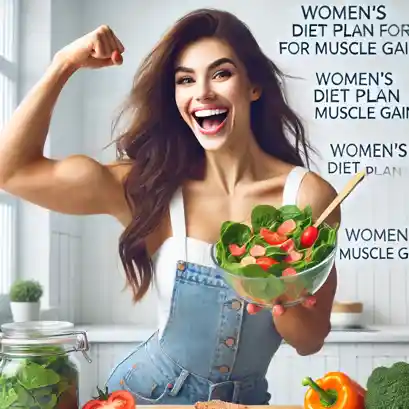
Unique Dietary Requirements for Women
Building muscle as a woman requires a tailored approach to meet specific nutritional needs. Women generally have lower calorie requirements than men but still need a balanced intake of proteins, fats, and carbohydrates to support muscle growth. Additionally, women need to focus on nutrients that support hormonal balance and bone health.
Key nutrients for muscle building in women include:
- Protein: Essential for muscle repair and growth. Aim for at least 1.4 to 1.8 grams per kilogram of body weight.
- Healthy Fats: Important for hormone production and overall health. Include sources like avocados, nuts, seeds, and olive oil.
- Complex Carbohydrates: Provide sustained energy for workouts and recovery. Focus on whole grains, sweet potatoes, and quinoa.
- Calcium and Vitamin D: Support bone health, which is crucial when engaging in weight training.
Balancing Hormones and Muscle Growth
Hormonal balance plays a significant role in muscle growth for women. Estrogen and progesterone levels can affect muscle mass and recovery. To maintain hormonal balance:
- Eat Healthy Fats: They are crucial for hormone production. Include sources like flaxseeds, chia seeds, and walnuts.
- Manage Stress: Chronic stress can disrupt hormonal balance. Incorporate stress-reducing activities like yoga and meditation.
- Ensure Adequate Sleep: Aim for 7-9 hours of sleep per night to support recovery and hormone regulation.
Sample Diet Plan Tailored for Women
Here’s a sample diet plan tailored for women that supports muscle building. This plan includes balanced meals with high protein, healthy fats, and complex carbohydrates.
Breakfast
- Greek Yogurt Parfait: 1 cup of Greek yogurt layered with granola, mixed berries, and a drizzle of honey.
- Avocado Toast with Eggs: 1 slice of whole-grain toast topped with mashed avocado and 2 poached eggs.
Mid-Morning Snack
- Protein Smoothie: Blend 1 scoop of protein powder, 1 banana, a handful of spinach, and almond milk.
- Almonds and Fresh Fruit: A handful of almonds with an apple or a handful of berries.
Lunch
- Quinoa and Chickpea Salad: 1 cup of cooked quinoa mixed with chickpeas, cherry tomatoes, cucumber, and a lemon-tahini dressing.
- Grilled Chicken Wrap: Whole-wheat wrap filled with grilled chicken, lettuce, avocado, and a light dressing.
Afternoon Snack
- Hummus and Veggies: 1 cup of hummus served with carrot sticks, cucumber slices, and bell pepper strips.
- Cottage Cheese and Pineapple: 1 cup of cottage cheese mixed with pineapple chunks.
Dinner
- Baked Salmon with Sweet Potatoes: 150 grams of baked salmon served with roasted sweet potatoes and steamed asparagus.
- Stir-Fried Tofu: Tofu stir-fried with broccoli, bell peppers, and snap peas in a soy-ginger sauce, served over brown rice.
Evening Snack
- Casein Protein Shake: 1 scoop of casein protein powder mixed with water or milk.
- Mixed Nuts: A small handful of mixed nuts like almonds, walnuts, and cashews.
Muscle Gain Diet Plan Without Supplements
How to Build Muscle Without Using Supplements
Building muscle without using supplements is entirely possible with the right diet and exercise routine. Focusing on whole foods that are rich in nutrients can provide everything your body needs to grow stronger and bigger. The key is to ensure you’re getting enough protein, healthy fats, and complex carbohydrates to fuel your workouts and aid recovery.
Benefits of a supplement-free diet:
- Natural Nutrients: Whole foods provide a wide range of vitamins, minerals, and other nutrients that supplements may not.
- Fewer Additives: Whole foods are less likely to contain artificial additives and preservatives.
- Sustainable Eating Habits: Relying on whole foods helps develop long-term healthy eating habits.
Natural Food Sources to Replace Common Supplements
Instead of turning to protein powders or creatine supplements, you can use natural food sources to meet your nutritional needs. Here are some excellent options:
- Protein: Lean meats, fish, eggs, dairy, legumes, nuts, seeds, and whole grains.
- Creatine: Red meat and fish, particularly herring, salmon, and tuna.
- BCAAs: Eggs, chicken, beef, fish, and soy products.
- Vitamins and Minerals: Fruits, vegetables, nuts, seeds, whole grains, and dairy.
Sample Diet Plan Without Supplements
Here’s a sample diet plan without supplements that includes balanced meals with high protein, healthy fats, and complex carbohydrates to support muscle growth.
Breakfast
- Scrambled Eggs with Spinach: 3 eggs scrambled with fresh spinach, served with whole-grain toast.
- Oatmeal with Almonds and Berries: 1 cup of oats cooked with water or milk, topped with sliced almonds and fresh berries.
Mid-Morning Snack
- Greek Yogurt with Honey: 1 cup of Greek yogurt drizzled with honey and topped with a handful of mixed nuts.
- Apple with Almond Butter: Sliced apple served with 2 tablespoons of almond butter.
Lunch
- Grilled Chicken Salad: Mixed greens, 1 grilled chicken breast, cherry tomatoes, cucumbers, and a light vinaigrette.
- Quinoa and Black Bean Bowl: 1 cup of quinoa mixed with black beans, corn, diced tomatoes, and avocado.
Afternoon Snack
- Cottage Cheese and Pineapple: 1 cup of cottage cheese mixed with pineapple chunks.
- Carrot and Celery Sticks with Hummus: 1 cup of hummus served with carrot and celery sticks.
Dinner
- Baked Salmon with Sweet Potatoes: 200 grams of baked salmon served with roasted sweet potatoes and steamed broccoli.
- Beef Stir-Fry: Lean beef strips stir-fried with bell peppers, onions, and snap peas, served over brown rice.
Evening Snack
- Mixed Nuts and Seeds: A small handful of almonds, walnuts, chia seeds, and flaxseeds.
- Cottage Cheese with Berries: 1 cup of cottage cheese topped with fresh berries.
Affordable Diet Plan for Muscle Building

Tips for Muscle Building on a Budget
Building muscle doesn’t have to break the bank. With smart choices and a little planning, you can create an affordable diet plan for muscle building that meets all your nutritional needs. Here are some tips to help you build muscle without overspending:
- Buy in Bulk: Purchasing staple foods like oats, rice, and beans in bulk can save you a significant amount of money.
- Choose Seasonal Produce: Seasonal fruits and vegetables are often cheaper and fresher.
- Plan Your Meals: Creating a meal plan helps you avoid impulse purchases and reduces food waste.
- Cook at Home: Preparing your meals at home is much more cost-effective than eating out.
- Look for Sales and Discounts: Take advantage of sales and discounts on high-protein foods like chicken, eggs, and dairy.
Cost-Effective Protein Sources
Protein is essential for muscle growth, but it doesn’t have to be expensive. Here are some cost-effective protein sources to include in your diet:
- Eggs: A versatile and inexpensive source of high-quality protein.
- Chicken: Particularly chicken thighs or drumsticks, which are often cheaper than breasts.
- Beans and Legumes: Lentils, chickpeas, and black beans are rich in protein and very affordable.
- Cottage Cheese: A great source of protein that is usually cheaper than other dairy products.
- Tuna: Canned tuna is a budget-friendly option that packs a protein punch.
- Peanut Butter: Affordable and protein-rich, perfect for snacks or adding to meals.
- Greek Yogurt: Look for store brands that offer this high-protein option at a lower price.
Sample Affordable Diet Plan
Here’s a sample affordable diet plan that includes budget-friendly meals and recipes to support your muscle-building goals.
Breakfast
- Oatmeal with Peanut Butter: Cook 1 cup of oats with water or milk, stir in 1 tablespoon of peanut butter, and top with a sliced banana.
- Scrambled Eggs: 3 scrambled eggs served with a slice of whole-grain toast.
Mid-Morning Snack
- Greek Yogurt with Honey: 1 cup of Greek yogurt drizzled with honey and topped with a handful of nuts.
- Apple and Peanut Butter: Sliced apple with 2 tablespoons of peanut butter.
Lunch
- Chicken and Rice Bowl: 1 grilled chicken thigh served with 1 cup of brown rice and steamed broccoli.
- Black Bean Salad: Mix 1 cup of black beans with diced tomatoes, corn, avocado, and a squeeze of lime.
Afternoon Snack
- Cottage Cheese with Pineapple: 1 cup of cottage cheese mixed with pineapple chunks.
- Hummus and Veggies: Carrot sticks, cucumber slices, and bell pepper strips served with 1 cup of hummus.
Dinner
- Lentil Curry: Cook 1 cup of lentils with canned tomatoes, spinach, and curry spices. Serve with brown rice.
- Tuna Pasta: 1 can of tuna mixed with whole-grain pasta, olive oil, cherry tomatoes, and spinach.
Evening Snack
- Mixed Nuts: A small handful of mixed nuts like almonds, walnuts, and sunflower seeds.
- Cottage Cheese and Berries: 1 cup of cottage cheese topped with fresh or frozen berries.
Budget-Friendly Meals and Recipes
Oatmeal with Peanut Butter Recipe
Ingredients:
- 1 cup oats
- 1 tablespoon peanut butter
- 1 banana
Instructions:
- Cook oats with water or milk according to package instructions.
- Stir in peanut butter until well combined.
- Top with sliced banana and enjoy.
Chicken and Rice Bowl Recipe
Ingredients:
- 1 chicken thigh
- 1 cup brown rice
- 1 cup steamed broccoli
Instructions:
- Grill or bake the chicken thigh until fully cooked.
- Cook brown rice according to package instructions.
- Steam broccoli until tender.
- Combine chicken, rice, and broccoli in a bowl.
Lentil Curry Recipe
Ingredients:
- 1 cup lentils
- 1 can diced tomatoes
- 2 cups spinach
- 1 tablespoon curry powder
- 1 teaspoon turmeric
- Salt and pepper to taste
Instructions:
- Cook lentils according to package instructions.
- In a large pot, combine cooked lentils, diced tomatoes, spinach, and spices.
- Simmer for 10-15 minutes until spinach is wilted and flavors meld.
- Serve over brown rice.
Conclusion
Building muscle requires more than just hitting the gym; it demands a well-structured diet tailored to your goals. Throughout this guide, we’ve explored the best diet plans for muscle gain, covering various aspects such as high-protein foods, meal plans for different dietary preferences, and cost-effective options.
Recap of the Key Points Discussed
- High Protein Intake: Essential for muscle repair and growth, whether through whole foods or supplements.
- Balanced Macronutrients: A mix of proteins, fats, and carbohydrates to fuel your workouts and support recovery.
- Tailored Meal Plans: Customized plans for men, women, vegetarians, and those on a budget.
- Natural Foods: Emphasizing the importance of whole, nutrient-dense foods over supplements.
- Cost-Effective Solutions: Strategies to build muscle without breaking the bank.
Importance of Consistency and Dedication
Consistency and dedication are crucial for achieving your muscle-building goals. It’s not just about following a diet plan for a week or two, but about making sustainable changes to your eating habits. Stick to your plan, adjust as needed, and remember that progress takes time and effort.
Encouragement to Start Implementing the Diet Plans
Now that you have a comprehensive understanding of the best diet plans for muscle gain, it’s time to take action. Start incorporating these tips and meal plans into your daily routine. Track your progress, stay committed, and don’t get discouraged by setbacks. Your dedication will pay off with noticeable muscle growth and improved overall health.

